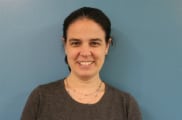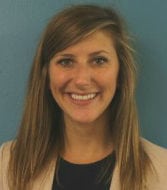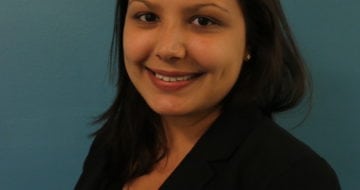 Words matter. This idea is not new, but it is especially critical when we talk about defining what we mean by college- and career-readiness. Creating a common understanding of what it means to be ready to succeed beyond high school can be challenging given the range of people and institutions who contribute a young person’s overall readiness. In 2009, AYPF published Success at Every Step: How 23 Programs Support Youth on the Path to College and Beyond, in which we used the best available research and research-supported practices to develop a logic model around defining college- and career-readiness. Subsequently, many others have contributed to this dialogue, but we have to recognize that coming to a common understanding and consensus will continue to take time.
Words matter. This idea is not new, but it is especially critical when we talk about defining what we mean by college- and career-readiness. Creating a common understanding of what it means to be ready to succeed beyond high school can be challenging given the range of people and institutions who contribute a young person’s overall readiness. In 2009, AYPF published Success at Every Step: How 23 Programs Support Youth on the Path to College and Beyond, in which we used the best available research and research-supported practices to develop a logic model around defining college- and career-readiness. Subsequently, many others have contributed to this dialogue, but we have to recognize that coming to a common understanding and consensus will continue to take time.
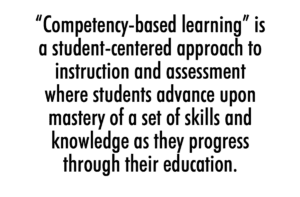 Recently, our colleagues at The Readiness Project at The Forum for Youth Investment released Readiness Abilities, combinations of skillets and mindsets which are necessary at some level to make academic milestones and career goals possible. As the abilities can be mapped back to practices and activities both inside and outside of the classroom, they help create a common language for educators, afterschool providers, families, and young people that better define how they are contributing to progress towards milestones and goals.
Recently, our colleagues at The Readiness Project at The Forum for Youth Investment released Readiness Abilities, combinations of skillets and mindsets which are necessary at some level to make academic milestones and career goals possible. As the abilities can be mapped back to practices and activities both inside and outside of the classroom, they help create a common language for educators, afterschool providers, families, and young people that better define how they are contributing to progress towards milestones and goals.
Now, we at AYPF are starting to dig deeper into two intersecting fields of practice: afterschool and competency-based learning (CBL). Both have been critical contributors to the idea of anytime, anywhere, any pace learning centered on what a student needs to be ready and succeed in academics, the workforce, and civic society.
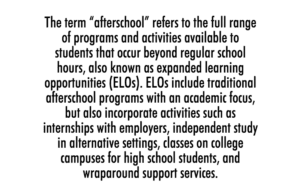 Granted, these sectors have communications challenges of their own. Policymakers, practitioners, and researchers often use a variety of terms to describe the same thing, which can sometimes result in talking past each other on a given topic. For example, a few common synonyms for CBL include proficiency-based, mastery-based, outcome-based, performance-based, and standards-based learning, education, and instruction. Same goes for afterschool, a term often used to encompass all out-of-school programming, including afterschool, summer, and expanded learning opportunities (ELOs).
Granted, these sectors have communications challenges of their own. Policymakers, practitioners, and researchers often use a variety of terms to describe the same thing, which can sometimes result in talking past each other on a given topic. For example, a few common synonyms for CBL include proficiency-based, mastery-based, outcome-based, performance-based, and standards-based learning, education, and instruction. Same goes for afterschool, a term often used to encompass all out-of-school programming, including afterschool, summer, and expanded learning opportunities (ELOs).
What we choose to call these fields isn’t important. Rather, acknowledging and overcoming language barriers opens up possibilities for afterschool and CBL to better collaborate and learn from each other’s strengths.
When competencies are developed at the intersection of afterschool and CBL in K-12, they can create a common language for educators and afterschool providers to discuss their strategies to move students to mastery around specific skills and abilities.
In New Hampshire, school districts are utilizing extended learning opportunities (ELOs) to allow students to demonstrate mastery through instruction or study outside of the traditional classroom. Through building partnerships with local afterschool providers, school districts have been able to leverage resources across their community to create learning experiences centered on a student’s interest and meeting the desired course competencies to earn course credit.
In Oregon, a work group of afterschool providers, community stakeholders, and issuing partners came together to develop a digital badges pilot project. Through participation in the employer-recognized digital badge pilot, afterschool programs can catalogue the different knowledge, skills, and abilities students gain through participation in meaningful learning experiences. These badges help students define their skills and abilities gained for future use both inside and outside the classroom.
This is just the tip of the iceberg. Stay tuned as AYPF will have more to say because as we said the beginning, words matter.
This post was co-written by Jennifer Brown Lerner, Deputy Director, and Jenna Tomasello, Program Associate.


